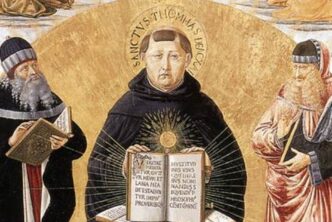Today I was reading through Pascal’s Pensées and came across this point in his argument:
280: The knowledge of God is very far from the love of Him.
Leading up to this thought, Pascal had quoted one M. de Roannez saying, “Reasons come to me afterwards, but at first a thing pleases or shocks me without my knowing the reason…” And also: “It is the heart which experiences God, and not the reason. This, then, is faith: God felt by the heart, not by reason.”
Besides this all seeming a little ironic coming from one of history’s greatest mathematicians and philosophers, I wonder whether or not the tradition of the Church would agree with Pascal’s assertion here. Is it true that reason plays so little a role in our love of God? And what exactly does Pascal mean when he says, “the knowledge of God is very far from the love of Him”? Does he mean to say that one can love God without knowing Him, or simply that knowledge and love are two distinct things (which seems too obvious.)
Let’s take a look in our Verbum library and see what we can find.
The first thing I want to do is pull up a search. Now, to begin I’d like to find instances of when the words “love of God” and “knowledge of God” are used anywhere in our library. I might start by opening two instances of the search panel and typing in “love of God” in one and “knowledge of God” in the other, but when I do this I find that I get thousands of results in each window:
There’s way too much info here to sift through (although I do see a few interesting hits in the Summa I might want to check back on later.) Let’s narrow this down by opening up a new search window and searching for “love of God” and “knowledge of God” on the same line:
OK —782 results is a lot better than the 7000+ we were looking at before. But we can do better. If I type in “NEAR” between these two phrases, we’ll find every time in our library that the phrase “love of God” is close to “knowledge of God”:
30 results? Much better. If we sort our results by “Ranked” we can see the most relevant results first and simply move down the list. This first result here is from A Catholic Commentary on Holy Scripture (you can click on this link to open it up in your Verbum desktop). It reads: “True and solid knowledge of God is not just theoretical but practical. True knowledge of God leads to love of God, which manifests itself in a constant effort to carry out the divine will expressed in the commandments. Christ must serve him as Model in this respect.”
I think this is a good response to Pascal’s quote earlier, but let’s see if we can find any more primary sources in the Tradition.
In The Complete Works of Saint John of the Cross, we read St. John’s 94th Maxim:
“The perfect love of God cannot subsist without the knowledge of God and of self.”
Here John lays out the idea that in order to have a perfect love of God, we must have knowledge so that our love can persist and flourish. St. John also ads that we need a knowledge of our selves—but that may be beside the point right now. Let’s look further.
The last two results are from Saint Thomas’ Summa. Let’s take a look at the first result from P1, q.82, article 3:
“…Wherefore the love of God is better than the knowledge of God; but, on the contrary, the knowledge of corporeal things is better than the love thereof.”
The second result comes from Part II-II, q.27, article 4:
“Since to love God is something greater than to know Him, especially in this state of life, it follows that love of God presupposes knowledge of God. And because this knowledge does not rest in creatures, but, through them, tends to something else, love begins there, and thence goes on to other things by a circular movement so to speak; for knowledge begins from creatures, tends to God, and love begins with God as the last end, and passes on to creatures.”
And just above, Aquinas states:
“Knowledge of God, through being mediate, is said to be enigmatic, and falls away in heaven, as sated in 1 Cor. 13:12. But charity does not fall away as stated in the same passage…”
So it appears here that Aquinas ranks the love of God above the knowledge of God, both in terms of greatness and priority. Notice that Aquinas’s statement does not contradict St. John’s: St. John states that the love of God cannot subsist without the knowledge of God, but not that the love of God cannot begin without knowledge.
Finally, let’s go back to the search results pulled up with the phrase “love of God” only. If we scroll down a little in results listed in the Summa, there’s one heading that stuck out to me. It’s Pt I-II, q.27, article 2: “Whether Knowledge is a Cause of Love?”
Aquinas states clearly that, “Augustine proves (De Trin, x. 1,2) that none can love what he does not know. Clicking on the link to De Trin we see Augustine writes:
“No studious person, then… loves things he does not know, even while he is urgent with the most vehement desire to know what he does not know.”
Does this contradict what Aquinas has previously said about the primacy of love over knowledge? No. In fact, Augustine here is just stating the obvious: You can’t be disposed towards something—one way or the other—if you don’t know of its existence (or any of its attributes.) Augustine (and subsequently Aquinas) isn’t claiming that reason is what allows us to experience God, only that in order to love Him we must know Him at some level.
In the final analysis, what we find is that Pascal’s thoughts aren’t incompatible with Tradition. Though Pascal’s words seem, at first blush, to encourage a kind of sensory or emotionalist approach to God, we see that his carefully worded argument is making a much more nuanced claim: That the desire for the knowledge of God is just that: a passion. God has revealed Himself to us, but we must have ears to listen and hearts to believe if we are to know and love Him.











Came across a 1.5 minute Peter Kreeft audio on this subject: https://www.peterkreeft.com/audio/misc/peter-kreeft_head-heart.mp3. Well worth the time.
I always appreciate your walk-through research, Aric. Thank you.